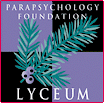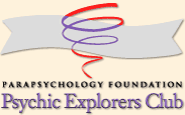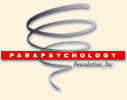 |
 |
| Carlos S. Alvarado, Ph.D. Parapsychology Foundation Throughout her career, Rhea took time to offer us recommendations to change the course of parapsychology. She focused on specific areas or problems, as well as in the big picture. In her paper “A Comparison of Old and New Methods of Response to Targets in ESP Experiments,” Rhea (1964) presented what has been long considered a seminal paper in the topic of internal attention states and ESP. As a commentator wrote in 1978: “Much of the recent work on ESP in altered states was inspired by an article by Rhea White … in which she analyzed the techniques used by various sensitives to enhance psychic receptivity. White found that these techniques contained many common elements, among which were relaxation and stilling of the mind preparatory to the emergence of psi-related visual imagery” (Palmer, 1978, p. 113). There is no question that this paper was influential, helping to focus the ideas of many members of the parapsychological community on a research problem. Furthermore, the paper has been considered an excellent example of the use of the old literature to address topics of modern concern (Alvarado, 1982, p. 267). Other important papers were Rhea’s examination of experimenters effects from different perspectives. This included discussions about the influence of individuals other than the experimenter (White, 1976a), and about the limits of the experimenter’s influence (White, 1976b). In an early paper, she discussed “depth perspectives” of experimental research (White, 1960). Among other things, Rhea focused on the motivation of researchers and how this could affect their work. Years later she returned to the topic and proposed that, to make progress in experimental parapsychology, the experimenter need to be personally interested and involved with the research problem (White, 1980a). Such ideas were extended to a consideration of explorations beyond the scientific method. Referring to the necessity to explore different levels of consciousness, she wrote: “In our present level of consciousness, we cannot make sense of our data. We have to see them in a new light, and to do so we must first find ways of entering that interior realm” (White, 1980b, p.46). In her 1984 Presidential Address to the Parapsychological Association, Rhea argued that the task was to “look for psi … within ourselves” (White, 1985, p. 173). She believed parapsychologists were separated from the creative parts of their psyches. In her view, the only strategy to follow was to place attention on meaning, and inner experience, something that would eventually affect experimentation and theorization. But the currect situation, she argued, was one of ambivalence about the nature of the phenomena of parapsychology. In her words: We can get very uncomfortable when people start carrying on as if psi were an everyday reality … we are suspicious if someone claims actually to be psychic and we do our best to explain away as many of that person’s seeming psychic experiences as we can. Now I am not suggesting that we should take everything a psychic says at face value … I am suggesting that we school ourselves to begin with an attitude of welcome toward persons who say they are psychic and have had psychic experiences. I think we should follow them as far as we can, trying to understand their language and what their experiences mean to them. As things now stand, we welcome psychics only on paper … This ambivalence about psi causes us to vacilate between welcoming psi and pushing it from us” (p. 178–179). In this address Rhea also argued that we could focus on psychological significance, instead of evidentiality, a suggestion she called a “heretical” idea. She also called for a study of the context in which psychic experiences occur, and of the importance and impact of the experience on individuals. In a paper entitled “An Experience-Centered Approach to Parapsychology” Rhea argued that parapsychology should abandon the current evidential paradigm focusing on gathering evidence for a paranormal event (White, 1990). Instead, she focused on suggesting a research program based on the phenomenology of the experiences and on their meaning for the experiencers (for additional details click here). In later papers she developed her ideas in other directions, considering as well the importance of feminist ideas of science and their implications for parapsychology (White, 1994). Alvarado, C. S. (1982). Historical perspective in parapsychology: Some practical considerations. Journal of the Society for Psychical Research, 51, 265–271. Palmer, J. (1978). Extrasensory Perception: Research Findings. In S. Krippner (Ed.), Advances in Parapsychological Research: Vol. 1: Extrasensory Perception (pp. 59–243). New York: Plenum Press. White, R. A. (1960). Depth Perspectives and Experimental Parapsychology. International Journal of Parapsychology, 2, 5–21. White, R. A. (1964). A Comparison of Old and New Methods of Response to Targets in ESP Experiments. Journal of the American Society for Psychical Research, 58, 21–56. Online at: http://www.aspr.com/methods.htm White, R. A. (1976a). The Influence of Persons Other Than the Experimenter on the Subject's Scores in Psi Experiments. Journal of the American Society for Psychical Research, 70, 133&150;166. Online at: http://www.aspr.com/persons.htm White, R. A. (1976b). The Limits of Experimenter Influence on Psi Test Results: Can Any Be Set? Journal of the American Society for Psychical Research, 70, 333–370. Online at: http://www.aspr.com/limits.htm White, R. A. (1980a). On the Genesis of Research Hypotheses in Parapsychology. Parapsychology Review, 11(1), 6–9. White, R. A. (1980b). Parapsychology and the Mystic Path. In W. G. Roll, R. L. Morris, & R. A. White (Eds.), Research in Parapsychology 1981 (pp. 45–46). Metuchen, NJ: Scarecrow Press. White, R. A. (1985). The Spontaneous, the Imaginal, and Psi: Foun¬dations for a Depth Parapsychology. In R. A. White & J. Solfvin (Eds.), Research in Parapsychology 1984 (pp. 166–190). Metuchen, NJ: Scarecrow Press. White, R. A. (1990). An Experience-Centered Approach to Parapsychology. Exceptional Human Experience, 8, 7–36. White, R. A. (1994). The Relevance to Parapsychology of a Feminist Approach to Science. In L. Coly & R. A. White (Eds.), Women in Parapsychology (pp. 1–20). New York: Parapsychology Foundation. |
 |

|
 www. parapsychology. org |
||